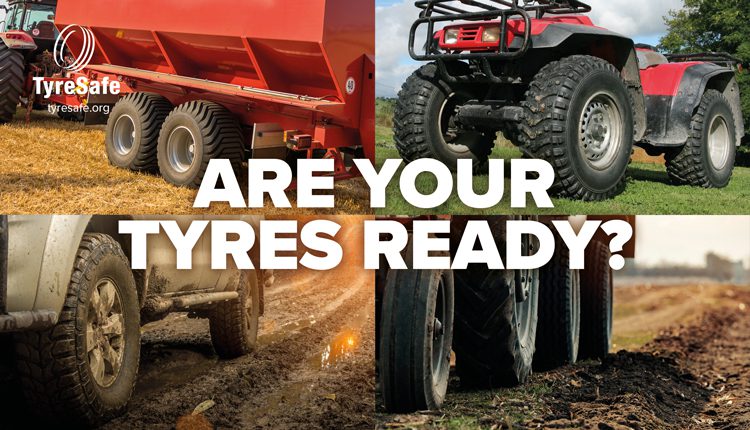In support of Farm Safety Week from July 17th to 21st, TyreSafe, the UK tyre safety organisation, is emphasising the critical importance of conducting regular tyre safety checks for farmers. According to the latest HSE fatal injuries in agriculture, forestry and fishing in GB report, 22 farm workers lost their lives on our farms in 2021/22.*
With agricultural vehicles playing a vital role in farm operations, it is essential to ensure that their tyres are in optimal condition to maintain safety on rural roads. TyreSafe is working with other organisations, including the National Farmers’ Union, to provide guidance and support around tyre safety and maintenance.
Agricultural trailers are subjected to demanding workloads, varying terrains, and extended periods of use, making tyre maintenance a top priority. Farm Safety Week provides a timely reminder for farmers to assess and address any potential tyre issues that could compromise their safety and that of other road users.
TyreSafe encourages farmers to follow these key guidelines to maintain tyre safety, using the acronyms ‘A.C.T’ – air pressure, condition and tread.
- Correct Tyre Air Pressure: Ensure tyres are inflated to the recommended pressure levels as specified by the manufacturer. Under-inflated or over-inflated tyres can affect vehicle stability and increase the risk of accidents.
- Condition – Inspect tyres regularly for signs of wear, bulges, cuts, and punctures. Pay particular attention to sidewall damage, as it can lead to sudden blowouts.
- Adequate Tread Depth: Monitor tread depth regularly using a reliable depth gauge. The legal minimum tread depth is 1.6mm across the central three-quarters of the tyre. However, for agricultural trailers, it is recommended to have a minimum tread depth of 3mm for optimal performance.
Farmers are also urged to check load capacity, ensuring trailers are not overloaded, as it puts excessive strain on the tyres and increases the risk of tyre failure. Refer to manufacturer guidelines for maximum load capacities.
In addition, for farmers using trailers, checks should be performed pre season and then daily to ensure:
- Tyre pressures are set for the imposed load and the speed of travel.
- Check the load and speed index of the tyres on the trailer to make sure they are going to have sufficient capacity for the imposed load and speed of operation.
- There are no gouges / blisters or bulges / deep cuts to the tyre casing. The casing should be checked for signs of ageing (such as ozone damage to the sidewalls) which will be evident by multiple cracks (perishing) in the sidewall.
- There are no steel or textile cords showing anywhere (sidewall or tread band).
- The tread band is not loose or detaching from the casing (can be common if someone is using a cheap truck remold or cold cap product on their agricultural trailer).
- The tread band is free from deep cuts and is not harbouring any flint or stone in the tread.
- The wheel nuts are correctly torqued and ideally wheel nut indicators are in place to enable a quick visual check to take place.
- The wheel rim is in good condition with no cracks or broken welds. Pay particular attention to the nave of the rim around the fixing holes to make sure there are no cracks in this area.
- If using an “old lorry” type trailer with dual wheels check between the twins to make sure there are no stones/rocks trapped between the tyres.
If in doubt, TyreSafe advises those towing to seek professional assistance and advice from reputable tyre specialists for expert guidance on selecting appropriate tyres for agricultural trailers, taking into account load requirements and usage conditions.
Stuart Lovatt, TyreSafe Chair, said, “The safety of farmers and all road users is of paramount importance. Agricultural trailers are an integral part of farm operations, and it is crucial to prioritise tyre safety. By conducting regular checks and following recommended maintenance practices, we can significantly reduce the risk of accidents caused by tyre-related issues.”
Farm Safety Week provides an excellent opportunity for farmers to proactively assess their vehicles’ and trailers’ tyre safety and make any necessary adjustments or replacements. By taking a proactive approach to tyre maintenance, farmers can contribute to safer roads and protect their livelihoods.
For more information on tyre safety and to access resources, tips, and guidance, please visit the TyreSafe website at www.tyresafe.org.
*source https://www.yellowwellies.org/engagement/
About TyreSafe:
TyreSafe is the UK charity dedicated to raising awareness about tyre safety in the UK. Through educational campaigns, industry collaborations, and community engagement, TyreSafe aims to promote responsible tyre maintenance practices and reduce the number of accidents caused by tyre-related issues.



